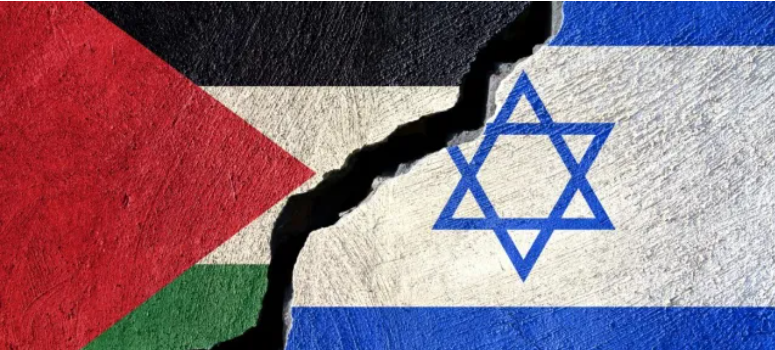
ISRAEL AND HAMAS: The Facts
Is Israel really the heartless tyrant it's being made out to be?
Anyone watching the global media coverage of the current conflict between the State of Israel and Hamas could be excused for having formed the view that Israel is some sort of ruthless aggressor – totally focused on eliminating Palestinian civilians in an act of revenge. But is this really what’s happening?
Let’s look past the media headlines and examine what’s really going on to see if we can separate fact from heavily skewed fiction:
How did the latest conflict start?
At 6.30am on the morning of October 7, 2023, Hamas launched an attack on Israel. The attack included hundreds of indiscriminately fired rockets, balaclava-clad fighters dropping from paragliders to cross the border, and ground assaults on civilians in their homes, on city streets and at a music festival. More than 1,200 people were killed, including a large number of internationals.
The nature of the reported atrocities that were committed during the attack included rape, torture, and the beheading of babies. Additionally, more than 240 people were taken hostage and dragged into Gaza. Of these, 76 are still being held with only 42 of those believed to be alive.
So, what is Hamas?
 Hamas is a militant Islamic Jihadist movement which first emerged in 1988 and which, until recently, ruled the Gaza Strip, to the south-west of Israel. The word ‘Hamas’ is an acronym for the Arabic phrase Ḥarakah al-Muqāwamah al-ʾIslāmiyyah which means ‘Islamic Resistance Movement’. (in Hebrew, the word ‘hamas’ means ‘violence’). In a very real sense, Hamas is driven by the same objectives which motivated ISIS. In fact, according to a leading Muslim academic, Hamas IS ISIS.
Hamas is a militant Islamic Jihadist movement which first emerged in 1988 and which, until recently, ruled the Gaza Strip, to the south-west of Israel. The word ‘Hamas’ is an acronym for the Arabic phrase Ḥarakah al-Muqāwamah al-ʾIslāmiyyah which means ‘Islamic Resistance Movement’. (in Hebrew, the word ‘hamas’ means ‘violence’). In a very real sense, Hamas is driven by the same objectives which motivated ISIS. In fact, according to a leading Muslim academic, Hamas IS ISIS.
Hamas took control of Gaza following elections held in 2006 in a bloody coup in which they murdered hundreds of political rivals and, until they were overthrown by Israel, exercised a dictatorship over the people of Gaza.
During it’s reign of terror, Hamas received significant funding and support from Iran, Qatar and Egypt. It also received support, indirectly, from the United Nations – particularly through UNRWA, a UN agency which has been repeatedly censured by many UN member nations for its support of terrorist activities, corruption, and for teaching children to glorify the murder of Jews in its schools.
What did Hamas want?
Hamas wanted to eliminate the Jews and establish a Caliphate in the whole land of Israel. It made no secret of this and repeatedly declared that its purpose was to create a state of ‘permanent total war between Israel and its neighbours’.
As such, the barbaric nature of the October 7 attack should not have come as a surprise to anyone. Hamas was a terrorist organisation, with no interest in the welfare of Palestinian civilians except as expedient political tools, and the attack was entirely consistent with the Hamas Charter which called for the total elimination of Israel and the Jewish people. This is typified in many places in the Charter, including Article 5 which says:
‘The Day of Judgment will not come about until Moslems fight Jews and kill them’.
The specific timing of the October massacre was probably intended to derail the peace talks between Israel and Saudi Arabia – but we should never lose sight of the real agenda of Hamas, which was to annihilate the Jewish people living in Israel.
This is perhaps best exemplified in the words of Mosab Hassan Youssef, son of one of the co-founders of Hamas, in a recent media interview in which he exposed the real goal of Hamas.
The full Hamas Charter can be read here. Key excerpts can be read here.
How did Israel respond to the attack by Hamas?
Israel responded in the same way that the US did when it quickly retaliated against Japan after the attack on Pearl Harbour in 1941 or when the US deployed troops in the Middle East after the attack of September 11 2001. Israel declared an intention to demolish Hamas and to eliminate its ability to attack Israeli or Israeli citizens again. To achieve this, Israeli forces carried out air strikes before entering the Gaza strip, from the north, and then spent over a year systematically working their way south, routing Hamas operatives and destroying their military infrastructure.
But why did Israel deliberately attack civilians?
 It didn’t. Israel’s fight was with Hamas – not civilians. In fact, Israel has been described as ‘the world’s most moral army’ by British Colonel, Richard Kemp, and goes above and beyond in its efforts to protect the lives of civilians. In the case of the Gaza conflict, this included giving Gaza civilians notice of its intention to target areas, dropping millions of leaflets (such as the one pictured), broadcasting radio messages, alerting Gazans through social media, sending texts and making tens of thousands of phone calls. and assisting those in need.
It didn’t. Israel’s fight was with Hamas – not civilians. In fact, Israel has been described as ‘the world’s most moral army’ by British Colonel, Richard Kemp, and goes above and beyond in its efforts to protect the lives of civilians. In the case of the Gaza conflict, this included giving Gaza civilians notice of its intention to target areas, dropping millions of leaflets (such as the one pictured), broadcasting radio messages, alerting Gazans through social media, sending texts and making tens of thousands of phone calls. and assisting those in need.
The IDF also warned people to evacuate and move south, and helped them to do so, prior to moving into areas where it intended to eliminate terrorist targets and infrastructure. As such, civilian casualties are not the result of deliberate attacks by Israel but rather the result of people choosing not to heed these warnings, or being barred from doing so by Hamas, which regularly blocked southern routes and prohibited people from leaving the north and even shooting its own citizens. In other cases, civilians remained in defiance or because Hamas assured them that Israel would not attack.
It’s also important to note that not all civilians in Gaza are peace-loving innocents who were simply victims of Hamas brutality. Hamas soldiers routinely dressed as civilians or members of the Press so as to blend in and so as to be counted as civilian deaths if they were killed. In other cases, civilians acted as active collaborators with Hamas – although recent footage also demonstrates that many of these people dropped the pretence of collaboration once they’re out of the control of Hamas.
But weren’t tens of thousands of Gazans killed?
We still have no idea of the real number of casualties resulting from the conflict. The Gaza Health Ministry, which provided almost all of the casualty numbers being quoted by the international media, was controlled by Hamas. It’s figures were entirely unverified and can be regarded as little more than propaganda. Remember, the Gaza Health Ministry is the organisation which claimed that over 500 people had been killed by an Israeli airstrike on a Gaza hospital – a claim which subsequently turned out to be completely false. It’s assertions cannot be trusted.
It’s also important to distinguish between innocent civilians and combatants. We know that Hamas terrorists came in the form of men, women, and teenage children – so resorting to the term ‘women and children’ as a way of portraying innocence has less meaning than the claim implies. We simply don’t yet know how many lives have been lost.
What about the claim that Israel committed genocide?
The use of the term ‘genocide’ to describe Israels actions is useful only in as much as it quickly identifies the views of the person you’re reading or listening to as those of a heavily partisan extremist, because the description simply doesn’t bear close scrutiny.
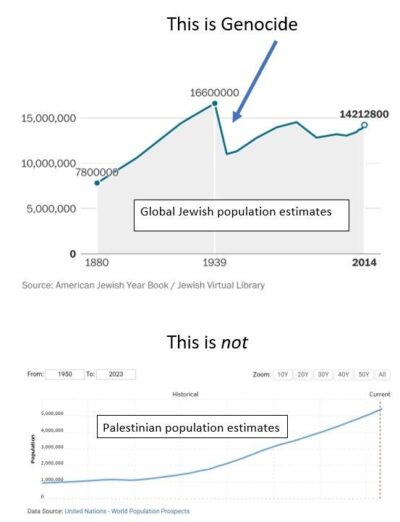 Putting aside the fact that the Palestinian population has increased by around 500% since the founding of Israel in 1948 – the goal of the IDF operation was the destruction of the Hamas, not of Palestinians.
Putting aside the fact that the Palestinian population has increased by around 500% since the founding of Israel in 1948 – the goal of the IDF operation was the destruction of the Hamas, not of Palestinians.
‘Genocide’ is defined, in international law, as the deliberate killing of a large number of people from a particular nation or ethnic group with the aim of destroying that nation or group. The two key conditions of that definition relate to scale and intent. In other words, Israel would have to be killing very large numbers of people ‘deliberately’. An example of this, from history, would be the Nazi attempt to exterminate the Jews in the 1930s and 1940s – an abomination which led to the death of 6 million Jews and which meets the ‘genocide’ definition of ‘scale and intent’.
By comparison, although we’re seeing large numbers being thrown around in respect of the situation in Gaza, it’s important to note that all of the numbers of deaths quoted by international media came from Hamas and Hamas controlled organisations such as the Gaza Health Ministry. There is no independent count or credible verification of these numbers and media organisations are generally accepting them without any evidence. This approach is unwise and we need to treat these numbers with extreme caution.
As noted above, we also know that Hamas regularly killed their own people – sometimes deliberately (where people were trying to flee, for example), and sometimes as the collateral damage of using them as human shields or as the victims of failed rocket launches (apparently as high as 1 in 5). Be aware that Hamas attributed all of these deaths to the IDF.
That said, it should be acknowledged that. whatever the number, there were a significant number of deaths of Gazan civilians, just as there were many deaths among German civilians during the bombing of German cities toward the end of WW2. But numbers, alone, are not the measure by which the ‘right’ and ‘wrong’ of a conflict should be weighed. Overall, Nazi Germany suffered around 7 million losses (5M military, 2M civilians), whereas the UK and the US lost 400-480K each. Does this make Nazi Germany the victim? In the Russia-Ukraine conflict, Ukraine lost approximately 70,000 lives, while Russia reportedly lost more. Does this make Russia the victim? Obviously not.
These casualties represent the ugly nature of warfare – not an intention to eliminate the Palestinians. Misusing the term ‘genocide’ for malicious political ends undermines the cause of human rights globally.
What about the claims that war crimes were committed?
Those claims are true.
Every time a Hamas combatant dressed in civilian clothing – that was a war crime. (by some estimates, the majority of those who were killed in the conflict were Hamas combatants, dressed as civilians).
Every time a Gaza Hospital was used as a terror base – that was a war crime.
Every time Hamas used civilians as human shields – that was a war crime.
Every instance of foreign aid being stolen by Hamas – war crime.
Every child which was radicalised and used to a military purpose – war crime.
So the claims of war crimes are absolutely true – but it wasn’t Israel committing them, it was Hamas.
Ok – but why did Israel break the latest ceasefire?
It didn’t. The ceasefire was broken by Hamas.
Remember, Israel has repeatedly stated that the precondition for any ceasefire is the release of hostages – but Hamas has made it equally clear that it doesn’t want peace. While third party activists and Governments around the world continue to insist that Israel must agree to an ongoing ceasefire, But even in its defeated state, Hamas has openly rejected the cessation of hostilities – something which shouldn’t surprise us given Article 13 of the Hamas Charter which explicitly rejects ‘peace’ initiatives and says:
“[Peace] initiatives, and so-called peaceful solutions and international conferences are in contradiction to the principles of the Islamic Resistance Movement. Those conferences are no more than a means to appoint the infidels as arbitrators in the lands of Islam. There is no solution for the Palestinian problem except by Jihad.” (Jihad means ‘Holy War’ in this context).
As such, reasonable commentators agree that a prolonged ceasefire wouldn’t work and that Hamas would use it as a cynical opportunity to re-arm and rebuild their capacity to attack Israel. This would simply prolong the process of eliminating what is left of Hamas.
Hamas has also repeatedly said that, given the opportunity, it would repeat the attack of 7 October, multiple times.
Ok, but shouldn’t the response have been ‘proportionate’?
The demands for a ‘proportionate’ response where Israel ‘pulls its punches’ so as not to inflict too much damage are based on a (deliberate?) misunderstanding of international humanitarian law (IHL). The central feature of that law is to prevent unnecessary casualties and protect innocent civilians, and the principle of proportionality forbids attacks in which the expected incidental loss of civilian life, injury to civilians, or damage to civilian objects would be excessive in relation to the anticipated military advantage gained.
But who should have determined the boundaries of this? In the absence of a clear answer, the IDF used independent lawyers to weigh each strike, and appealled to the Israeli Supreme Court for urgent review when the situation was unclear.
The IHL legally permits the risk of collateral damage to achieve a just military objective. The greater the objective, the greater the extent of permitted risk of incidental damage or even, God forbid, death. Of course, this does not mean that Israel should not have done everything it could to minimize casualties, which is why Israel took important measures, including warning civilians to leave endangered areas before attacks, however this was made much more difficult by the fact that Hamas used civilians as human shields and continued to hide munition stores in hospitals, schools and mosques.
It’s also worth noting that there is only ever a clamour for a proportionate response when the world community is attacking Israel and academics, activists and politicians are silent on this matter in respect of other regional conflicts around the planet.
Couldn’t this all have been solved by simply recognising a Palestinian state?
There are actually two Palestinian territories. One is located in the Gaza Strip and was ruled by Hamas (which was not interested in a ‘two state’ solution and has a stated goal of wiping out Israel). The other is located to the east of Israel, in the area known as the West Bank, and governed by an organisation called Fatah. These territories aren’t directly related and operate very differently.
 Despite this, Israel has come to the negotiating table many times in the past but its offers to work with the Palestinian leaders to establish a Palestinian state have all been rejected. For example, in 2000, Israel made a groundbreaking offer which included roughly 97 percent of the West Bank; all of Gaza, where Israel still had settlers; and a capital in East Jerusalem. Then Palestinian leader, Yasser Arafat, spurned the proposal and, instead, ignited a strategic onslaught of suicide bombings against Israel that became known as the Second Intifada. This lasted for four-and-a-half years and ended with the death of 1,000 Israelis and more than 3,000 Palestinians.
Despite this, Israel has come to the negotiating table many times in the past but its offers to work with the Palestinian leaders to establish a Palestinian state have all been rejected. For example, in 2000, Israel made a groundbreaking offer which included roughly 97 percent of the West Bank; all of Gaza, where Israel still had settlers; and a capital in East Jerusalem. Then Palestinian leader, Yasser Arafat, spurned the proposal and, instead, ignited a strategic onslaught of suicide bombings against Israel that became known as the Second Intifada. This lasted for four-and-a-half years and ended with the death of 1,000 Israelis and more than 3,000 Palestinians.
There have also been many other opportunities to create a Palestinian state. Parties negotiating on behalf of the Palestinian people were offered a state at the 1937 Peel Commission, the 1947 UN Partition Plan, the 1967 Khartoum Summit, the 1991 Madrid Conference, the 2001 Arab Summit, the 2005 Disengagement from Gaza by Israel, the 2007 Annapolis Conference, the 2008 Realignment Plan, the 2010 Joint Peace Talks, the 2013 Joint Peace Talks, the 2019 Bahrain Workshop and the 2020 Trump Peace Plan. All offers were rejected.
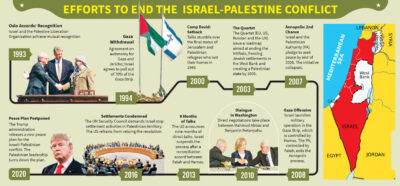
So, Hamas wouldn’t accept a solution which included an Israeli State?
Correct. When Israel withdrew from Gaza in 2005 it forcibly transferred every last Jew from Gaza at the same time so as to allow the Palestinians to establish their own de facto state. Instead, Hamas chose to turn Gaza into a terrorist base.
This was entirely consistent with the Hamas Charter. Hamas had no interest in negotiating for a peaceful settlement and when western protesters chant the phrase ‘from the River to the Sea’ they are, knowingly or unknowingly, parroting part of that Charter, which refers to taking all the land between the Jordan River, in the east, and the Mediterranean Sea, in the west – including the entire nation of Israel.
‘From the (Jordan) River to the (Mediterranean) Sea’ is a call for the annihilation and extermination of the Jews as the first step of a declared process to win the world for an extremist form of Islam.
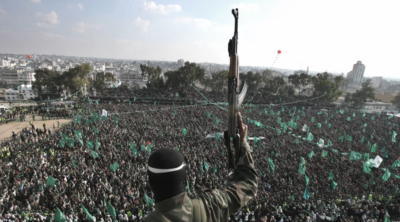
But, as a colonising power, shouldn’t Israel give up the land anyway?
Israel is not a ‘colonising power’, and the use of that term is offensive and misguided.
By definition, a colonising power is a nation which has its base elsewhere (eg, London as the base of the former British Empire) and which sets up an outpost of itself (a ‘colony’) by occupying another nation. There are many many examples of this around the world – although most former colonies have long since achieved independence from their coloniser.
However, this definition cannot be applied to Israel in any respect. The first Jewish state was established, on the same land on which Israel exists today, almost 4,000 years ago – and while this land was certainly colonised by other powers between the 7th century BC and the 20th century of the modern era, the Jews have never been ‘based’ anywhere else. They have always regarded Israel as their home and there has never ceased to be a Jewish presence there. In fact, Jewish communities in that land were well documented throughout the history although their numbers reduced as a result of repeated Arab violence over the centuries.
The irony of this is that Israel should be the poster child for the aspirations of those who claim that colonised people should be given back total control of their former territory.
Ok, but why do the Jews have the right to that land in the modern era?
During the First World War, the Ottoman Empire, which had control over the land, was defeated by the Allies and lost control of most of the Middle East. As such, the British controlled the land and what is now Jordan under a mandate from the League of Nations and later, the United Nations.
Over the next quarter century, the British and the French set about reshaping the Middle East – establishing modern democracies and creating new nations in the territory formerly controlled by the conquered Ottomans. However, there have been no protest movements subsequently questioning the legal legitimacy of any of those new nations.
The re-establishment of a Jewish state was also debated as part of that regional reorganisation. A strong movement for a Jewish homeland had been reignited in the 19th century and there was already considerable recognition of the atrocious way in which Jews had been persecuted in Europe and the Middle East over the previous centuries. However, that work was interrupted by World War Two – a conflict which led to the Holocaust and the murder of six million Jews in the death camps of Europe.
 This was the catalyst which finally focused international action, and, in November 1947, the United Nations voted to establish a Jewish state in some of the territory to which the Jews had a recognised and ancient claim. The Arabs rejected the idea, but the vote was passed, and the modern nation of Israel formally came into existence six months later in May 1948, following an Arab invasion which Israel successfully repelled.
This was the catalyst which finally focused international action, and, in November 1947, the United Nations voted to establish a Jewish state in some of the territory to which the Jews had a recognised and ancient claim. The Arabs rejected the idea, but the vote was passed, and the modern nation of Israel formally came into existence six months later in May 1948, following an Arab invasion which Israel successfully repelled.
As such, Israel exists on the same modern legal basis as every other nation in the Middle East.
But wasn’t there an Arab Palestinian State prior to the First World War?
No. There has never been an independent Arab Palestinian State.
Between 638 CE and the defeat of the Ottoman Empire in the early twentieth century, the land was controlled by a series of Islamic Caliphates (all of which were based somewhere else in the Middle East) and (briefly) by a Christian Kingdom established by the Crusaders. Between the first century BC and the 7th century AD the land was under the control of the Romans and then the Byzantium’s and was almost entirely populated by Jews. Prior to this it was variously controlled by the Babylonians, the Medes and the Persians, various Hellenistic powers, and by the Jewish Hasmonean dynasty. Prior to all of these, of course, the land was controlled by Hebrews (Jews), and was under Hebrew control for well over a thousand years prior to the Babylonians.
But, at no time, has there ever been an independent Arab state of Palestine and maps which show a progressive reduction in ‘Palestinian territory’ after 1948 are either dishonest or misinformed as the land, prior to that time, was controlled by the British, not an imaginary Palestinian state.
So, were there ever a ‘Palestinian’ people?
Not in the sense that we now understand that term. The word ‘Palestine’ probably derives from the word ‘Philistia’ which was the name given to the land of the Philistines who occupied the pocket of land between Tel Aviv and Gaza over 3,000 years ago in the 12th Century BC. These people are even mentioned in the Bible where they are referred to as ‘Plishtim’ which, in Hebrew, means ‘invaders’. These people weren’t Arabic (there’s no ‘P’ in the Arabic language). They disappeared from the historical and archaeological record by the late 5th century BC, after they were assimilated into the Babylonian Empire but the name ‘Palestina’ was revived by the Romans, in the 2nd Century AD, primarily as an insult to the Jewish occupants of the land at that time.
Then who are the people who we now refer to as the ‘Palestinians’?
Mostly ethnic Arabs whose ancestry can be traced to other parts of the Middle East – particularly the area now encompassed by the modern nation of Jordan. This doesn’t make them any less important – but it gives context to some of the claims being made about their origin.
That said, there’s nothing wrong with now referring to these people as ‘Palestinians’. In the same way that New Zealanders, Australians and Canadians are legitimate descriptions of national groups, even though those nations didn’t exist a few hundred years ago – modern ‘Palestinians’ are a real people in the 21st century. We just need to be careful not to confuse the modern Palestinian people with the ancient and indigenous occupants of that land. They are not the same people.
Is it true that Israel keeps Arabs ‘separate’ in a form of Apartheid?
No, it’s not. Apartheid is a system where people groups are separated within a nation state and have different rights based on ethnicity. This does not happen in Israel.
Within Israel, Jewish Israelis, Arab Israelis, as well as Israelis of other ethnicities all have exactly the same rights (except for some minor differences such as military service which all Jews are required to undertake, whereas serving in the services in voluntary for Arabs). Indeed, Arab Israelis (who make up about 20% of the population of the country) are represented at every level of Israeli society and enjoy the same democratic rights as their Jewish counterparts.
The best and most prolific voice on this is Yoseph Haddad, an Israeli Arab who speaks extensively on the myth of Israeli apartheid and the reality of life in Israel, for Arabs. His many outstanding videos and articles can be found on LinkedIn and Youtube.
Wait – I’m confused. There are Arabs in Israel?
Yes – and these people are citizens of Israel with exactly the same rights as any other Israeli citizen.
And there are also Arabs in Gaza and the West Bank?
Yes – and these people are governed by their own governing authorities. They are not part of Israel.
How did we end up with these different groups?
The history of how we got to this point is long and detailed – but it all started with that 1947 UN resolution to establish two states in the region – a Jewish State and a Palestinian State. The Jews accepted the resolution and invited the Arabs who lived in the territory that had been granted to the Jews to remain and work together to build the new nation of Israel.
Egypt and Jordan rejected the resolution and encouraged all Arabs living there to leave so that they could attack and wipe out the Jews. Around 20% of the 950,000 Arabs in the region stayed and now make up the population of modern Israeli Arabs and their descendants.
The other 80% fled to the border between Israel and Jordan and to the Gaza Strip, where they remain to this day.
Why didn’t other Muslim nations take them in?
Good question. There’s a pretty strong argument that Jordan, in particular, should have absorbed the Palestinians in the West Bank in 1948. The West Bank shares a common border with Jordan, they are effectively the same people and, most importantly, it could be argued that the British had already set up a ‘Palestinian’ state when they established the Kingdom of Jordan in 1946. It’s also noteworthy that Israel absorbed about 700,000 Jewish refugees, from Middle Eastern nations, during and immediately after its War of Independence in 1948.
Yet neither Jordan, nor any other Middle Eastern nation, has ever proposed assimilating any of these people – instead, leaving the problem to Israel to solve.
So, the people in Gaza and the West Bank are now refugees?
Defining a ‘refugee’ is problematic because there are a number of conflicting definitions in circulation – but almost all of these agree on one thing – that a refugee is someone who will not, or cannot, return to their country of origin. If this criteria was applied to the Palestinians in Gaza or the West Bank, then the number of refugees would be significantly fewer than 800,000 (this being the approximate number of people who fled to these places under instruction from Egypt and Jordan in 1948).
However, the methodology used to count the number of Palestinian refugees is unique and Palestinians are the only group where the descendants of an original refugee are also classified as refugees. This leads to an ever-increasing spiral and means that the number of Palestinians classified as refugees is now counted in the millions – even counting Palestinians who have long since emigrated to other nations and have full citizenship of those nations. This is an abuse of the term and makes the establishment of an accurate count almost impossible.
This is further compounded by a use of the term which seeks to convey the impression of temporary dwelling and people living in tent communities with limited services – in contrast to the reality where Gaza and the West Bank are now made up of developed population centres with schools, hospitals and roads – just like other cities.
This nonsensical practice is the equivalent of still designating the descendants of the survivors of war-torn post WW2 European cities as ‘refugees’, even today. Whatever your view of the political situation between Israel and the Palestinian territories – it is ridiculous to continue to refer to these people as ‘refugees’ 75 years after the fact.
But if Gaza is separate from Israel that’s apartheid, right?
Let’s just repeat the definition from above: Apartheid is a system where people groups are separated within a nation state and have different rights based on ethnicity.
Gaza is not part of Israel and is not regarded, by Israel, as part of the Israeli state. It has been independently governed by Hamas since 2006 – and the political reality of the situation in Israel and Gaza is not ‘apartheid’ anymore than the different treatment of people in North and South Korea is apartheid.
Ok – but isn’t Israel now going to relocate Gaza Palestinians?
Probably. Israel had hoped that, since 2005, Gaza would have developed its own economy and become self-reliant. Instead, Hamas turned the territory into a virtual prison and syphoned off international aid into the development of a military infrastructure with which to attack Israel. This left Israel with no choice but to dismantle the Hamas military machine and resign itself to a period of rebuilding and the restoration of democracy in Gaza.
This is no different to what the Allies did in Europe after World War Two or what the Americans have done after various conflicts over the past 70 years.
In fact, it is the Americans, under President Trump, who are now proposing that all Palestinians be moved out of Gaza and the area redeveloped as a kind of US protectorate. The proposal has both supporters and detractors and there are many reasons to suggest that it won’t happen – but it’s an attempt at a new solution to an intractable problem.
So, what do Gazans and other Arabs think of all this?
While there is clearly support for Hamas, within Gaza, there are also many voices in strong opposition to this terrorist group.
This video, purportedly from a citizen of Gaza, expresses the frustration of Palestinians living within that territory. This is consistent with other videos and articles, from Palestinians in the West Bank and Gaza, calling out Hamas for its responsibility for what is happening. And this video, filmed at various locations in Europe, records the thoughts and fears of former Palestinians who are still terrified at the consequences of speaking out.
Another message from Mosab Hassan Yousef, former member of Hamas and son of a co-founder of Hamas, is a powerful and impassioned challenge to those in the west who support Hamas and other pro-Palestine organisations.
In yet another video, Luai Ahmed, a Yemeni expat living in Sweden also calls out the hypocrisy of western protesters and exposes their double standard on the real war crimes of other Middle Eastern nations. Likewise, this Iranian woman shames those who are protesting in the west and those who chant the genocidal phrase ‘from the river to the sea’.
This angry dialogue, by Egyptian TV Host Ibrahim Eissa, slams Hamas Official Mousa Abu Marzouk’s, claim that the safety of Gaza Civilians’ is the responsibility of the U.N., rather than Hamas.
But aren’t there Jews who disagree with you?
Of course there are. Israel is a democracy, and, like any democracy, it is home to people with many different viewpoints. Indeed, that’s one of the strengths of democracy. Across the border in Gaza, the citizens don’t have that same freedom and put their very lives at risk if they dare to express views which are in opposition to Hamas. But the reality that some Jews hold views which differ from the facts in this article doesn’t magically imbue the holders of those views with some sort of special status. We need to deal in facts, not opinions.
So, I can be pro-Israel AND pro-Palestine?
Yes, of course – in fact, you should be. There is no contradiction between supporting Israel and supporting the work that Israel has done to free the residents of Gaza from the tyranny of Hamas.
What you can’t be is pro-Israel and pro-Hamas. The two things are diametric opposites.
Why aren’t I getting this information through the mainstream media?
It’s easy to jump to the claim of ‘media bias’ when you don’t see your views getting equal airtime with the opposing narrative – but it’s difficult to rationalise the overwhelming media resistance to the Israeli perspective in any other way. Well researched releases providing facts and dates are routinely ignored, while the opinions of extremist pro-Hamas commentators are afforded high visibility and treated with respect.
To be fair, there are exceptions to this overwhelming bias, but they are islands in a dark sea in a climate where media objectivity is a rare commodity. If this were any other conflict, in any other part of the world, the names and pictures of the hostages taken by the Hamas terrorists would be flooding our screens and media, with daily demands for their release coming from every quarter. The fact that this is not happening speaks volumes about the acquiescence of world media and their support of the Hamas narrative.
Instead the media is turning a blind eye to scenes that would outrage most decent people if they were aware of them. The following are links to various incidents taking place in the UK which you probably haven’t seen because, while a full-scale civilisational emergency has been erupting in London, the mainstream media has been concentrating instead on demonising Israel with Hamas propaganda.
Here, a Muslim mob invade a Pret a Manger cafe and demand that any Israel donors there must leave;
Here, a protester telling the truth about Hamas is assaulted — reportedly with a knife — by Hamas supporters;
Here, poppy sellers at Victoria station are forced to move;
Here, a woman at Victoria station is left in tears after she and her husband are confronted by a demonstrator over wearing poppy lapel pins;
Here, red paint has been thrown at a London house whose mezuzah on the front door identifies its occupants as Jews;
Here, a young woman aggressively asks “Are you a Jew” on a London bus;
Here, demonstrators shout “Death to all Jews” at Victoria station;
Here, abuse is screamed outside a synagogue on the Jewish Sabbath, November 11;
Here, an Israel government spokesman pushes back effectively (when he can get a word in ) against a BBC interviewer smouldering with contempt, hostility and malevolent bias against Israel.
And although this is from Gaza itself, here is a Gazan civilian fleeing down an IDF-provided humanitarian corridor to the south telling a truth that the BBC and other Hamas apologists are so desperately trying to deny: the Arabs betrayed us, the Jews are kind to us.
So, is there bias? Draw your own conclusions.
But it’s not just media – thousands are marching around the world!
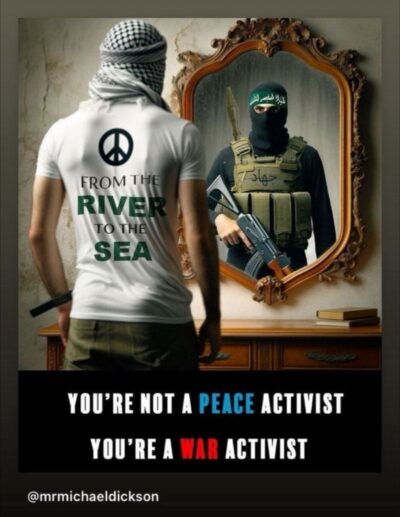 That’s true. Following the collective shock at the atrocities against Israeli civilians on October 7, the world now seems to have returned to a default position of blaming and attacking Israel and the Jewish people. Hundreds of thousands have marched calling for ‘justice’ and demanding a ceasefire in Gaza.
That’s true. Following the collective shock at the atrocities against Israeli civilians on October 7, the world now seems to have returned to a default position of blaming and attacking Israel and the Jewish people. Hundreds of thousands have marched calling for ‘justice’ and demanding a ceasefire in Gaza.
Imagine that, within days of the Al-Qaeda attack on the Twin Towers, on 9/11, citizens and students on university campuses around the world had held rallies in support of the terrorists and bullied and attacked those who called them out. Yet this is exactly what is happening in response to the Hamas attack on Israel and Jews are being openly attacked on the streets of western cities.
The extent to which protest movements have gone to justify the atrocities committed by Hamas is beyond comprehension. Murder, rape, infanticide, and kidnapping have been justified as ‘resistance’ by baying mobs screaming for ‘peace’ as they commit acts of violence against Jews. In New York, American flags were pulled down and desecrated by pro-Hamas activists. In Australia, a country which has traditionally supported Israel and the Jewish people, Jewish students were told not to wear their school uniform on buses for fear of attacks. In London activists demanded that Israel be ‘smashed’ and rejected the right of the Jewish state to defend itself. The list goes on.
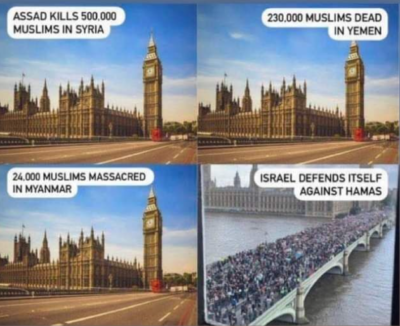 Yet there is a huge hypocrisy between the outrage directed at Israel and the wall of silence regarding the treatment of Palestinians when this treatment is at the hands of anyone other than the Israelis.
Yet there is a huge hypocrisy between the outrage directed at Israel and the wall of silence regarding the treatment of Palestinians when this treatment is at the hands of anyone other than the Israelis.
Conspicuously, there has also been no condemnation of the sectarian fighting in Yemen which has led to almost 400,000 deaths since 2011. Nor did the world react so strongly to the death of one million Muslims in the 1980 to 1988 war between Iran and Iraq, the 250,000 deaths in the Lebanese Civil War between Muslims against and Maronite Christians between 1975 and 1990, the 200,000 killed in the Algerian Civil War between 1991 and 2002, the estimated 2.5 million killed in the Sudanese Civil Wars between 1983 and 2005, the hundreds of thousands in the Darfur conflict between 2003 and 2010 or the 860,000 killed in the Congo.
In contrast, there had been around 10,000 Israeli deaths and 30,000 Arab deaths as a result of the Arab-Israeli conflict, between 1948 and the period prior to 7 October. None of these deaths are acceptable, of course, but the scale, relative to these other conflicts, shines a light on the hypocrisy of those who claim to be advocating for justice.
As noted by Noor Dahri, a Muslim and the Executive Director at Islamic Theology and Counterterrorism, based in London – nobody cares about atrocities in the Middle East if the Jews can’t be blamed for them.
What did Universities do?
Unbelievably, Universities, traditionally the vanguard of free speech and the support of the underdog, shut down criticism of Hamas and supported antisemitism.
The administrations of many leading academic institutions, including Harvard, Columbia, Penn, NYU, Cornell, Cooper Union, among many others around the world, were conspicuously unwilling to condemn the massacre of October 7, without equivocation, while casting an approving eye over the multitude of campus displays of anti-Semitism and the revolting Jew hatred of students and even their own staff.
We saw college personnel in the US telling frightened Jews to lock themselves in their homes or college libraries while standing by as pro-Hamas protesters violently rioted and threatened the safety of those Jews. These institutions excused those acts as the expression of free speech, yet they did not afford the same courtesy to those who exposed Hamas and, in recent times, many of these same institutions had had no issue forcing universities to cancel speakers whose free speech did not adhere to the prevailing narrative.
Who else is supported Hamas?
 That’s where this all starts to get even stranger.
That’s where this all starts to get even stranger.
Those who supported Hamas and defended their position were (and still are) a weird mix of bedfellows including various organisations on the left, University students, Gen Z and a large section of the mainstream media – joined by white supremacists, the far right, and (literally) the ghost and shadow of the Nazi regime which murdered six million Jews less than 80 years ago.
Clearly this isn’t the ‘normal’ grouping of aligned interests that we would expect to see in response to other issues.
So why the hypocrisy?
It’s difficult to see the attacks on Israel and the Jewish people as anything other than the same antisemitic evil which has plagued the Jews for over 2,000 years.
One of the reasons for the re-establishment of the State of Israel was the recognition of the hatred and violence which has been visited upon these people for millennia, yet we’re seeing that play out, again, before our very eyes.
What causes antisemitism?
Good question. Antisemitism has been with us for a long time – but how do we explain this new round of hatred of Jews? Clearly some of it is borne of extreme stupidity and ignorance – but what underpins the moral depravity which allows people to justify rape, murder and the taking of hostages because ‘the targets are jews’?
Nothing about this behaviour is rational.
If you ask an anti-Israel protestor why they hate Israel they will parrot an inane argument of the kind that we have already dismissed in this Q & A and will quickly get angry in the face of the simple facts which demolish their beliefs – but that won’t diminish the intensity of their hatred. When you stare into the eyes of such people, you’ll be gazing directly into the pit of hell.
 If you ask the same question of someone less reactionary, they’ll insist that they don’t hate Israel or the Jews but that they’re just upholding international law, supposed property rights, or historic grievances. In reality, this is just a more sophisticated approach to antisemitism and the underlying spirit is the same.
If you ask the same question of someone less reactionary, they’ll insist that they don’t hate Israel or the Jews but that they’re just upholding international law, supposed property rights, or historic grievances. In reality, this is just a more sophisticated approach to antisemitism and the underlying spirit is the same.
So, what causes this? Why is there such a disproportionate hatred and hypocrisy toward the Jewish people?
People of faith will suggest that the cause isn’t logical and that it traces its roots from ancient promises made in the Jewish and Christian scriptures. However, regardless of where you sit – antisemitism is real and is, once again, on the rise, globally.
Could we see a return to the way the Jews were once treated in Europe?
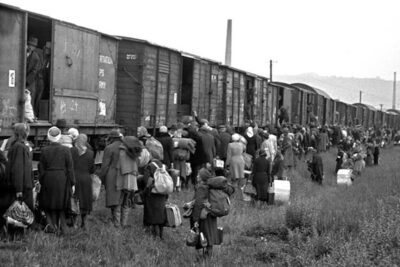 It’s possible – and next time, it won’t just be in Europe.
It’s possible – and next time, it won’t just be in Europe.
All around the world, Jews are being attacked, beaten, murdered, and separated out for persecution. If you find that hard to believe, keep a close eye on the international news. We may not have quite reached the point where Jews are being required to wear a yellow star, but there is clearly an intensification of antisemitism.
But if the ostracization of Jews happens again as it did during the 1930s and 1940s, there will be a key difference. This time, Jews have a homeland to flee to, which explains why we are seeing such a strong focus on destroying that nation too.
Evil takes many forms.
So, what can I do to support Israel?
If you’ve ever wondered what you would have done if you’d lived during the time of the Holocaust, here’s your chance to find out. Here are some immediate and practical suggestions:
- Don’t just stand by. That’s what the people of Europe did when Hitler was trying to exterminate the Jews.
- Post the link to this page in your social media.
- Refer people to this page when discussing the current conflict.
- Write to your Government representative, insisting that the Government supports Israel and takes a harder line on Hamas.
- Respond to biased and wrong media coverage with letters to the editor.
- Write to media organisations demanding that they take a more balanced approach to their reporting of the war.
- Write to schools, universities and businesses that allow antisemitism, insisting that they cease.
- Join (or even organize) a public march or rally in support of Israel.
- Give to one of the many charities now raising funds to help affected Israelis.
- Subscribe to my newsletter so that I can keep you up to date.
But why bother? Will anyone even listen?
Absolutely! For example, while poll after poll shows that most Uni activists have very little understanding of the issues in contention, we also know that it’s possible to change minds if it’s done the right way.
Take the recent poll of students at Berkeley University in California. It showed some disturbing gaps in the knowledge of those who had been actively protesting against Israel and the Jews. For example, 32.8% of those polled supported the chant ‘from the river to the sea’ ‘very enthusiastically’, while a further 53.2% also supported it but not quite so enthusiastically. But of these 90% of respondents, only 47% of these were actually able to identify where the river and the sea actually are. When questioned, some identified these as the Nile River, the Euphrates and even the Caribbean and the Atlantic!
What’s particularly interesting is that significant numbers of these people actually changed their view and abandoned their support of the Hamas chant when confronted with the reality of what it would mean for Israel. In fact, in total, 67.8% of students went from supporting the mantra ‘from the river to the sea’ to rejecting it, once they understood it’s true implications.
Most of these students had never seen a map of the Middle East, and knew little about the regions history, demography or geography – which tells us that those who are promoting hate and extremism depend on the political ignorance of their audiences.
“If the Arabs put down their weapons today, there would be no more violence. If the Jews put down their weapons today, there would be no more Israel”.
Discover more from ashleychurch.com
Subscribe to get the latest posts sent to your email.
